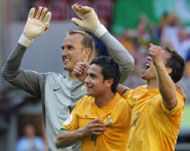Referee comes clean on clanger
Egyptian referee Essam Abd El Fatah gave an on field apology to Australian goal keeper Mark Schwarzer after awarding a dubious goal to Japan in the Group F clash in Kaiserslautern on Monday.

The Japanese took the lead in the 26th minute through the tournaments’ first controversial goal when forwards Yanagisawa Atsushi and Naohiro Takahara both collided with Schwarzer as he attempted to reach a floated Shunsuke Nakamura pass.
The ball ended up in the back of the net with Schwarzer sprawled on the ground and the Australians appealing for a foul, however referee El Fatah awarded the goal much to the disbelief of Socceroos players and coaching staff.
A contrite El Fatah apologised to the Australian keeper during the match, admitting he had made a mistake in allowing the goal.
“The referee admitted to me afterwards that he made a mistake,” the Middlesbrough keeper said.
“I went over to him when one of the Japanese players was injured in our 18-yard box five minutes after they scored and I said to him ‘referee, what’s the story?’ and he just said ‘sorry, I made a mistake.'”
“He said after the game to Mark Viduka that God was on his side because the result went our way in the end and he knew that he had made a big mistake.
“He said God was on his side in the sense that it didn’t affect the result in the end, so it was big of him to admit that.”
Cahill makes history
Substitute midfielder Tim Cahill scored the first ever Australian goal in World Cup Finals history, and then followed up with a second strike five minutes later to firmly etch his name in the record books.
 |
|
Australia celebrates: (from left) |
Striker John Aloisi sealed the match for Australia in added time, but the team from Down Under kept their fans waiting anxiously for 84 minutes before getting on the scoreboard, before securing their first victory at the World Cup Finals.
Cahill, who in 1994 played his first international football for Western Samoa’s Under 20s side at just 14 years of age, had to go through a process which dragged on for nine years in order to be eligible to play for Australia.
“Just being part of this World Cup means everything to all of us,” said Cahill.
“To get the goal is the icing on the cake but we live for moments like these. We dreamed of this when we were kids. We have to thank each other, and our families. I’m just really happy to be a part of it,” Cahill added modestly.
Coach’s view
Aussie coach Guus Hiddink was thrilled with his players’ efforts and their come back win from a goal down.
“We are very happy, so let’s enjoy this moment. I said to the boys before they went out ‘You’re here now in Germany, so enjoy it, but work for it.’ They are so nice to work with,” said the Dutchman.
In the other dressing room disappointed Japan coach Zico was upset with his team’s efforts suggesting that they could have killed the match off after going one goal up.
“We did not do anything after taking the lead,” the Brazilian said.
“We had two clear goal scoring chances on the counter-attack but if you do not put the ball in at one end you sometimes concede it at the other. The way Australia turned the game on its head is difficult for us to stomach,” Zico added.
“This is football. There is no use in stopping here and we have to prepare for the next match.”
A buoyant Australia now travel to Munich to face World Champions Brazil on Sunday 18th June, while Japan play Croatia in Nuremberg earlier on the same day.